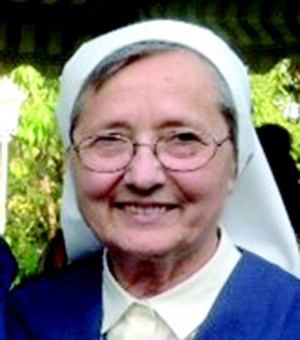It was an evening, after dinner, when our formators accompanied us to greet Prima Maestra Thecla. I had arrived in Alba in September 1954. I barely knew that she was an important superior who had arrived from Rome—whom everyone called Prima Maestra.
Sitting in the middle of a beautiful group of sisters, she was busy cleaning green beans while entertaining the group with her stories. After a greeting, our formators introduced us to Prima Maestra. From that brief visit, I grew to cherish our frequent encounters, especially after her travels. She would describe her experiences in vivid detail, awakening in us a passion for the mission and helping us grasp more deeply the meaning of our own specific call.
Before our first profession, she listened to us personally. She asked me many questions: if I was happy, if I enjoyed our apostolate. “Certainly,” I replied, “especially propaganda [outreach].” As a result, I soon began to study philosophy and theology.
In those days, when Prima Maestra was in Rome, on Sundays after the second Mass [customary at the time] she gave us a conference. It was easy to listen to her because she spoke of divine things in a simple and practical way. One evening, after the renewal of vows, I don’t remember the year, she gifted us with her presence. As always, Prima Maestra spoke about her travels, especially about India. She told us she could never ask a sister to go there—it would have to be someone who offered herself freely.
During the Second Vatican Council, she organized luncheons for bishops from countries where the Daughters of St. Paul were present. In the mornings, one of them would celebrate Mass and speak to us about his country—a concrete way to keep our missionary spirit alive. The mission became something real and tangible. Listening to the bishops, M. Thecla would also become attuned to their most urgent personal needs—clothing, or how to face the cold for those coming from warm climates.
At that time, the three of us younger members of the student group were sent to the branch houses. It was during this time that Maestra Thecla passed away, and we were unable to attend her funeral. But I’m sure she thought of us, because that same September we rejoined the others to resume our theological studies.
One by one, the sisters in our group eventually left for the missions, full of the enthusiasm she had instilled in us. I was the last to go. After five years serving as formator for the aspirants, I was sent to the final mission she had personally approved: Uganda.
I hold many memories of the Prima Maestra: her personal interest in each of us, her trust, her love. She made us feel loved and responsible, and even the decisions that might feel like corrections were, in the end, always for our good.
Among the legacies she left me, in addition to her missionary enthusiasm and openness, was trust in the superiors, reinforced by what the Founder wrote to me after the spiritual exercises he himself led: “Every blessing. Live in faith: for in the Constitutions and in the dispositions of the superiors you will find holiness of life.” Fr. Alberione (June 17, 1965).
I return often to the message that Prima Maestra Thecla gave me on the eve of my first profession: “Always be serene and happy in the arms of the Most Holy Virgin and you will become a saint. In union of prayer.” M. Thecla (23.6.60).
These were the conditions for following and putting into practice what Blessed James Alberione indicated as the sure path for our sanctification and apostolate.
Teresa Marcazzan, fsp
